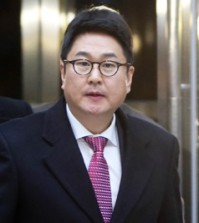- California Assembly OKs highest minimum wage in nation
- S. Korea unveils first graphic cigarette warnings
- US joins with South Korea, Japan in bid to deter North Korea
- LPGA golfer Chun In-gee finally back in action
- S. Korea won’t be top seed in final World Cup qualification round
- US men’s soccer misses 2nd straight Olympics
- US back on track in qualifying with 4-0 win over Guatemala
- High-intensity workout injuries spawn cottage industry
- CDC expands range of Zika mosquitoes into parts of Northeast
- Who knew? ‘The Walking Dead’ is helping families connect
Search warrants on Daum Kakao user data grow fourfold in 2 years
SEOUL (Yonhap) — Search warrants on user data of Daum Kakao Corp., South Korea’s Internet portal and mobile messenger venture, grew fourfold in the last two years, the company said in its transparency report released Friday, amid heightening public concerns over privacy violations by authorities.
Daum Kakao received 8,636 court orders to submit dialogues, sign-in logs and ID addresses in 2014, compared with 2,174 tallied in 2012.
The disclosure comes after its rival Naver Corp., the operator of South Korea’s No. 1 search engine Naver, published its annual privacy report in which it said the corresponding figure amounted to a total of 9,342 requests, increasing 6.3 times over the cited period.
Confiscated user data via search warrants include electronic material stored in their servers that were handed over to investigative bodies by either copying them to another device or in print.
It is the first time that a detailed report has been released by the top two Korean IT companies. Naver has published its version every year since 2012, but they didn’t include figures based on search warrants. Daum Kakao was only founded last year through a merger between search engine operator Daum Corp. and mobile startup Kakao Corp.
The reports came as privacy issues flared up in South Korea after a lawmaker revealed last October that Daum Kakao had been providing the prosecution with users’ chat records on free mobile messenger KakaoTalk.
The revelation led its CEO Lee Sirgoo to announce that his company will no longer comply with wiretapping, citing non-obligatory clauses in related provisions, as both the government and companies faced strong public backlash over cyber surveillance by the authorities.
More than 80,000 user accounts from the two firms were provided as potential evidence to investigations last year, down 54 percent from 2012, the reports showed. The number had sharply dropped because the Constitutional Court ruled in 2012 that government interference in telecommunication activities for an indefinite period of time is against the constitution.
















